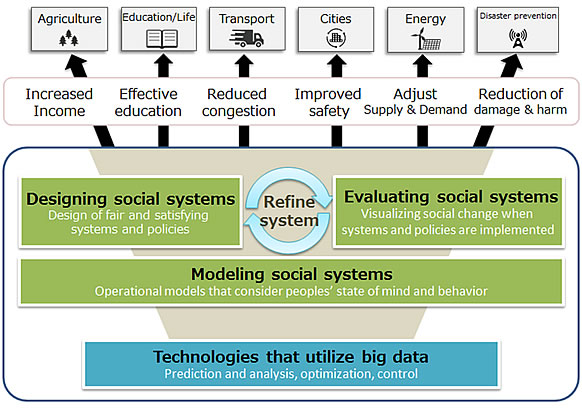Fukuoka, Tokyo, and Kawasaki, Japan, September 12, 2014
Kyushu University, Fujitsu Limited, and Fujitsu Laboratories Limited today announced that they have established the Fujitsu Social Mathematics Joint Research Unit. Operating from within Kyushu University's Institute of Mathematics for Industry, they will begin joint research on mathematical techniques for implementing social policies and programs that are fair and to which the public will be highly receptive.
In the past, there has been no way to appropriately take into account human behavior and psychology when designing public facilities, distribution systems, and other such policies and programs. This has sometimes led to poor user uptake, difficulties in use due to unexpected behaviors, and other problems. The new joint research department aims to solve these problems by conducting research that clarifies human behavior and psychology by bringing together social science research and mathematical techniques based on big data.
Positioning the joint research unit as a place for collaboration between industry and academia as well as for interdisciplinary academic research activities, Kyushu University, Fujitsu, and Fujitsu Laboratories seek to promote the development of methodologies and techniques for creating policies and programs to which the public will be highly receptive and that contribute to resolving social problems.
Background
The Institute of Mathematics for Industry at Kyushu University is the first center to be established in Asia for mathematical research into industrial technologies. With a foundation built on wide-ranging mathematical research, it has become known around the world as an unparalleled center for industrial mathematics. On April 23, 2013, it was designated by the Ministry of Culture, Sports, Science, and Technology (MEXT) as a "Joint Research Center for Advanced and Fundamental Mathematics-for-Industry."
To address social problems that cannot be resolved by individual technologies used in isolation, Fujitsu and Fujitsu Laboratories seek to integrate technologies-primarily technologies that put big data to use-that are designed to resolve a variety of social problems, and then promote their implementation and verify their effectiveness. This is part of their broader goal of bringing about a Human Centric Intelligent Society, a prosperous society that promotes the well-being of people.
Using their respective technological strengths, Kyushu University, Fujitsu, and Fujitsu Laboratories established the joint research unit after deciding on the effectiveness of developing mathematical techniques to the design of social structures (social systems) that all stakeholders, including program designers, service providers, and users, will consider fair and very well-accepted.
Research Overview
There is growing interest in using mathematical techniques, such as analyses and optimizations involving the use of a variety of data, to design policies and programs intended to address social issues, such as improving public safety or relieving congestion where people congregate. There are, however, limits to using solely existing data technologies, and it generally is difficult to design policies and programs that, by taking into account the impact of human behavior and psychology, will be fair and to which the public will be receptive. In order to solve broad-based social issues in appropriate ways, it is essential to take into consideration human behavior and psychology, including incentives, such as the incentives between services providers and users, in order to balance supply and demand and resolve tradeoffs.
The new joint research unit seeks to model human behavior and psychology and develop mathematical techniques for optimizing the design of social structures and programs. By pursuing research that integrates data-utilization technologies for analysis, optimization, and control with economic, psychological, and other social science research, the partners hope to establish design methodologies for public policies and programs, and to see them implemented.
Main lines of research are as follows.
- Techniques for modeling social systems: Techniques for building models of social systems that mathematically describe human psychology and behavior.
- Techniques for designing social systems: Techniques for designing policies and programs that are fair and have good public receptivity using the social system models.
- Techniques for evaluating social systems: Techniques for the visualization of the societal impact of the policies and programs that have been designed.
Organization of the Joint Research unit
With the establishment of this unit, joint research activities will be conducted with the participation of full-time, as well as collaborating instructors from Kyushu University's Institute of Mathematics for Industry, engineers from Fujitsu, and researchers from Fujitsu Laboratories.
The center will also offer personnel exchange with related departments in Kyushu University's academic and research institutions as well as other research institutions in Japan and around the world, with the goal of developing talent and promoting R&D on practical solutions that address social problems.
 Figure 1: Research approach and examples of social issues
Figure 1: Research approach and examples of social issues
![]() Phone: 092-802-4402
Phone: 092-802-4402![]() E-mail: jimu@math.kyushu-u.ac.jp
E-mail: jimu@math.kyushu-u.ac.jp